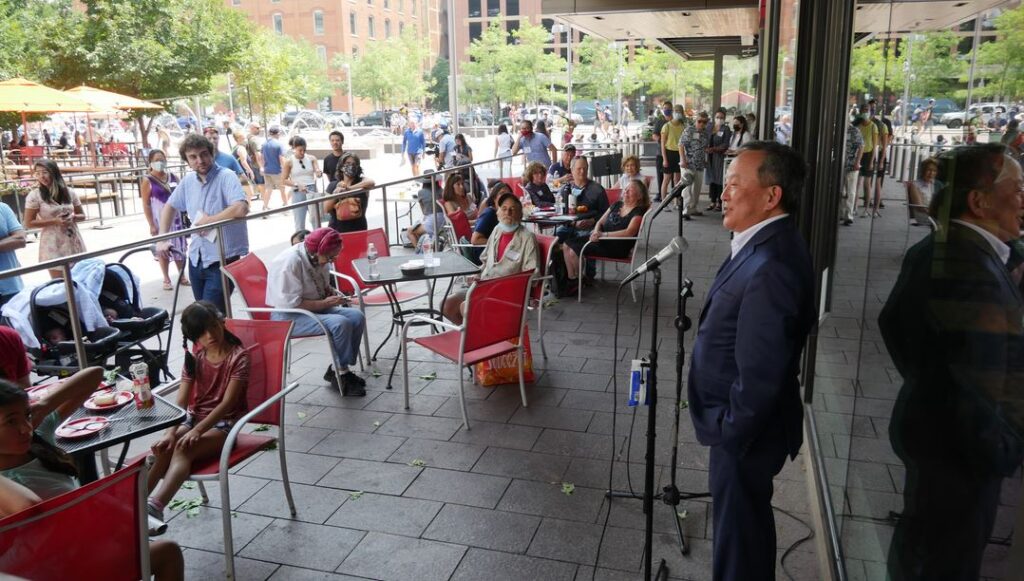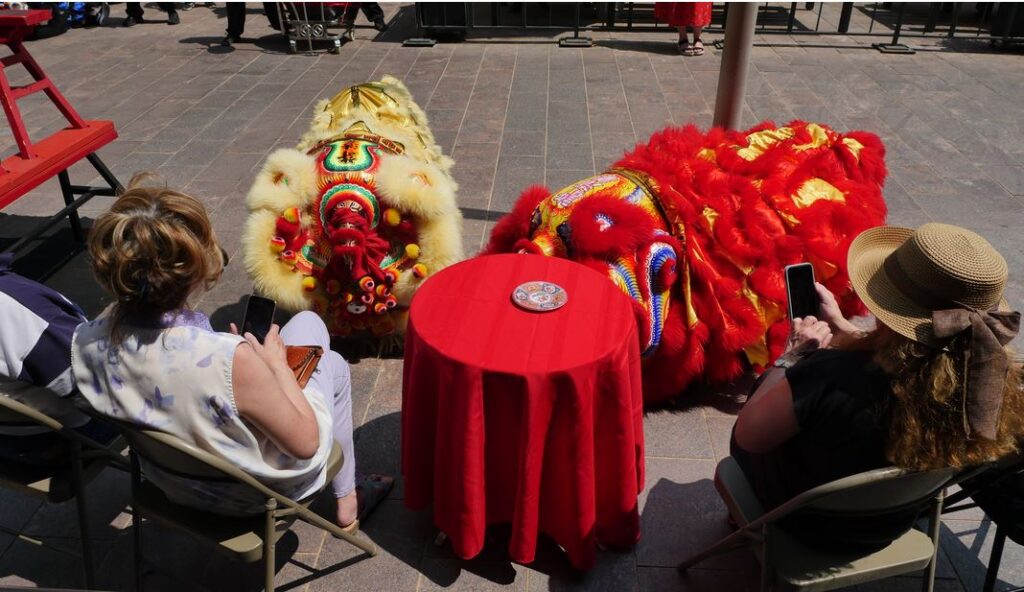By Gil Asakawa
Most people in Denver – even longtime Denverites – don’t know that the city’s popular Lower Downtown district or LoDo was once home to a thriving Chinatown. Chinatown’s past has been long forgotten as recent immigrants have spread out and settled away from downtown Denver.
But an August 8 event helped remind people of that lost history.
It hasn’t helped that Denver’s Chinatown was nearly destroyed on October 31, 1880 when thousands of Whites tore through the neighborhood destroying property and beating one man, Look Young, to death. Although the Chinese returned to LoDo and rebuilt their homes and businesses, that anti-Chinese race riot was used as an example to pass the 1882 Chinese Exclusion Act, the only law restricting immigration by nationality ever in American history.
Denver’s Chinatown continued into the 20th century — a Chinese Masonic Temple stood in LoDo into the 1920s and ‘30s, and an American Chinese Club existed after WWII – but there’s now no trace left of the community.
That is, except for one “Lower Downtown District Walking Tour” plaque on a building across the street from Coors Field, the baseball stadium that recently hosted the MLB All-Star Game. The title on the plaque rads “Hop Alley/Chinese Riot of 1880,” and the text focuses on the existence of opium dens (“hop” was a negative term for opium) even though many of the customers were White, and names three White business owners who protected some fleeing Chinese without naming Look Young. The white-centric view of Chinatown doesn’t capture the vibrancy of the district, which had been described in newspaper articles of the time.

In 2020, the members of the Denver Asian American Pacific Islander Commission (DAAPIC), which serves as a connection for the AAPI community with the mayor’s office, began planning efforts to remove the offensive plaque. Earlier this year, those DAAPIC members joined with other community leaders and allies including architects and academics to form Colorado Asian Pacific United (CAPU), and organization that is applying for 501(c)3 non-profit status. CAPU’s first project is to Re-envision Denver’s Historic Chinatown.
Although CAPU has the support of city government – the Mayor’s office and the councilwoman who represents the LoDo district – as well as business and historic district associations to replace the current plaque and find expanded ways to celebrate Denver’s Chinese history, the plaque removal and plans to put a mural on the wall of the building where plaque currently hangs have been placed on hold. No one, from CAPU to the mayor’s office to local media, have been able to get the owner of the building to respond to requests for permission to change the plaque.
Undaunted, CAPU held its August 8 event at Zoe Ma Ma, a hip Chinese street food restaurant next to Union Station, the LoDo anchor where the original Chinese immigrants arrived beginning in 1869. With a nod towards East Asian cultural traditions, the double-eight of 8/8 was an auspicious date for the event.
Proposed new text for a historical marker to replace the current plaque was presented by Dr. William Wei, a history professor at the University of Colorado and former Colorado State Historian Chinese (attached in separate document). He celebrated the presence and influence of in Denver. The event was kicked off with a colorful, acrobatic lion dance performance from Boulder-based Shaolin Hung Mei Kung Fu that included a touching tribute honoring members of two families whose ancestors lived and operated business in Chinatown. Two lions came to the feet of the family members and bowed down respectfully, as audience members teared up.

Representatives of the families also spoke about their great-grandfathers’ and other family members’ experiences in Denver through the century-and-half they’ve been in Colorado, including serving in the US military during WWII.
The event was widely covered by the local media and CAPU plans to host other public events to continue education the public about the lost history of Chinatown. Annual Lunar New Year celebrations (with more lion dances) are planned, as well as eventually, a possible “international district/Chinatown” similar to the one in Seattle that combines Chinese, Japanese and Vietnamese communities in one business district. Long-term goals even include a dream of an Asian American museum in Denver’s LoDo. All of these would fit CAPU’s mission to “celebrate, education and collaborate” to tell the stories of Asians and other communities of color in Denver.
CAPU has a Facebook page at https://www.facebook.com/ColoradoAPUnited, and a CAPU/Historic Chinatown website is being assembled. The organization recently launched a GoFundMe campaign to help it achieve its goals, at https://www.gofundme.com/f/reenvisioning-denvers-historic-chinatown.
Gil Asakawa is a former Denver Asian American Pacific Islander Commission member, and a founding member of CAPU.
AsAmNews has Asian America in its heart. We’re an all-volunteer effort of dedicated staff and interns. Check out our new Instagram account. Go to our Twitter feed and Facebook page for more content. Please consider interning, joining our staff, or submitting a story or making a contribution.

